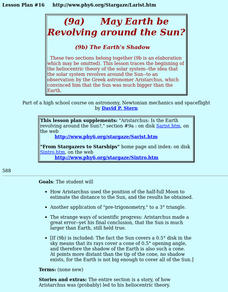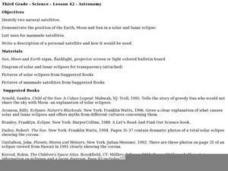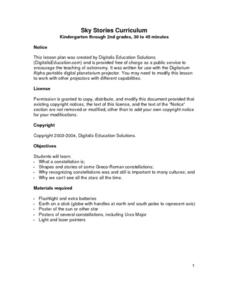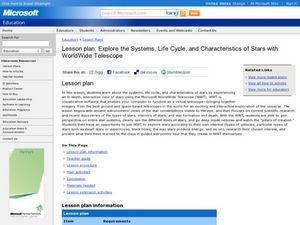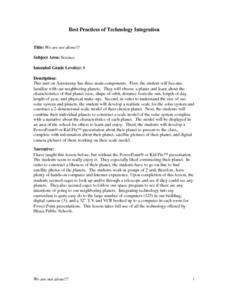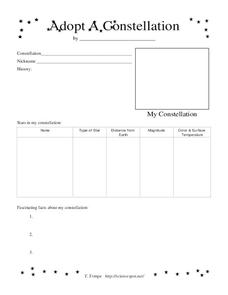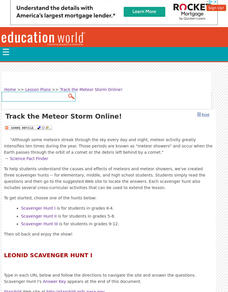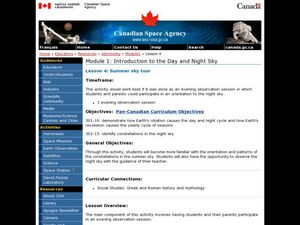Curated OER
Scale Model of the Solar System
Students explore the size of the planets. In this science instructional activity, students create a scale model of the solar system. Students determine a scaling factor and calculate the size of their planets. Students create a scale...
Curated OER
May The Earth Be Revolving Around The Sun?
Students trace the beginning of the heliocentric theory of the solar system--the idea that the solar system revolves around the Sun--to an observation by the Greek astronomer Aristarchus, which convinced him that the Sun was much bigger...
Curated OER
(S-1) Sunlight and the Earth
Learners discuss the solar heating of the Earth and atmosphere, its heat loss proceses, and the way these relate to weather and climate.
Curated OER
Science - Lesson 42 - Astronomy
Third graders demonstrate the position of the Earth, Moon, and Sun in a solar and lunar eclipse. They list uses for manmade satellites and write a description of how a satellite would be use.
Curated OER
Sky Stories
Students are introduced to the branch of science known as astronomy. They discuss stars and constellations and then view the night sky using a portable digital planetarium projector. They identify a variety of constellations and...
Curated OER
Reasons for Seasons
Students model the tilt of the Earth as it orbits the Sun. They explain the meaning and characteristics of solstices and equinoxes. They explain that sunlight hits the Earth at different angles at different locations over the course of...
Curated OER
Star Quest
Students review the concepts of the branch of science known as astronomy. They discuss stars and constellations and then view the night sky using a portable digital planetarium projector. They identify a variety of constellations using a...
Curated OER
Swinging on a Star
Students explore the issues that might arise if humans were to go on an interstellar space mission. They synthesize their understanding of interstellar travel by writing scenes from a science fiction novel that would depict such a mission.
Curated OER
SUNSPOTS SPOTTED
Students study sunspots and their motion, from data gathered, they determine the significance of the sunspot data. The data be used to calculate the rotational period of the sun. They draw conclusions as to the sunspot's impact on the...
Curated OER
Explore the Characteristics of Stars with Microsoft WorldWide Telescope
Students explore the characteristics of stars. In this space science activity, students use the Microsoft WorldWide Telescope program to identify the properties of stars and identify the stars in the galaxy.
Curated OER
Stars and Constellations
Ninth graders investigate how ancient cultures viewed their world in terms of astronomy. They read and discuss an informational handout, construct an astrolabe, and locate stars and constellations using star charts.
Curated OER
Timekeeping by the Sun
Students measure shadows to learn about the Sun-Earth relationship. In this astronomy lesson, students create a shadow stick of a Pokemon character and record measurements of its shadow in a data chart. Follow-up discussions guide...
Curated OER
We Are Not Alone!!!
Eighth graders explore the area of astronomy. They explore Earth's neighboring planets. Students research a planet's characteristics. They develop a scale model of the solar system and a narrative about the planets.
Curated OER
Follow the Sun
Students use a simple model of the Earth and Sun as seen from space to explore the sun's apparent movement across the sky over the course of a day and year. They consider the apparent direction of movement and changes in the sun's angle.
Curated OER
Reading Satellite Images
Students analyze satellite images. In this astronomy lesson, students examine 3 satellite images in order to understand how satellite images are taken and what they can teach scientists.
Curated OER
Stellar Navigation
Middle schoolers are introduced to the concept of stellar navigation. Inside a portable digital planetarium they identify various stars that were used as a navigational tool. They go through several activities in which they attempt to...
Curated OER
Adopt a Constellation
Students adopt a constellation and find detailed information about their constellation. For this constellation lesson plan, students use the web to find information about a constellation of their choice. They identify the history of the...
Curated OER
Track the Meteor Storm Online!: Leonid Meteor Showers, Astronomy
Young scholars are guided through an online series of readings and questions to explore the Leonid Meteor Showers and related topics. Modifications are provided for teaching this instructional activity to k-4, 5-8, and 9-12 students.
Curated OER
Measuring the Diameter of Our Star
Students conduct an experiment to measure the diameter of the sun. In this astronomy activity, students construct a simple equipment to collect scientific data. They calculate the sun's diameter using a given formula.
Curated OER
Galaxies
Tenth graders explore the structure and content of galaxies. Through discussion, lab, and hands-on activities, they discover the general structure of the three types of galaxies as well as the effect they have on the structure and...
Curated OER
It's Just a Phase
Sixth graders are introduced to the correct terminology for the phases of the moon and arrange picture cards in the correct order. They use flashlights and Styrofoam balls to illustrate the phases of the moon. They write science journal...
Curated OER
Summer Sky Tour
Learners explore space science by participating in a constellation identification activity. In this astronomy lesson, students view star charts based on the different seasons and define a list of astronomy related terms. Learners...
Virginia Department of Education
Modeling the Big Bang Theory
Young astronomers learn about the Big Bang Theory and redshift through a hands-on activity in the last installment of a three-part series. Participants draw dots on balloons and then inflate them to model how galaxies moved farther apart...
Curated OER
Planet Interiors
Young scholars compare and contrast the Earth's interior with 2 other planets by looking at images on the computer. For this planet interiors lesson plan, students write a paper about their findings.



